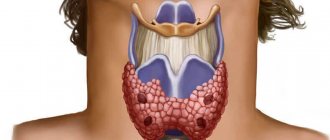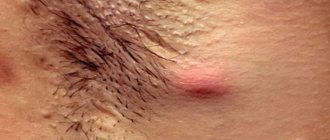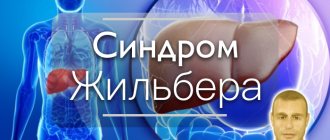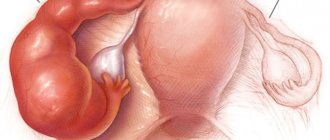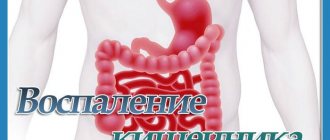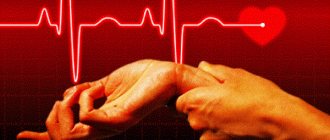Classification and characteristics of hypertension
Hypertension is a disease associated with constantly high levels of blood pressure (blood pressure) and dysfunction of the cardiovascular system.
For each degree of hypertension there are corresponding blood pressure standards; detailed information is contained in the table below.
| Category AD | GARDEN | DBP |
| Optimal | Below 120 | Below 80 |
| Normal | 120-129 | 80-84 |
| Increased | 130-139 | 85-89 |
| AG 1 tbsp. | 140-159 | 90-99 |
| AG 2 tbsp. | 160-179 | 100-109 |
| AG 3 tbsp. | Equal to or greater than 180 | Equal to or greater than 110 |
| Isolated systolic arterial hypertension | Equal to or greater than 140 | Less than 90 |
Each stage of development of arterial hypertension (AH) has its own symptoms.
- The first degree of arterial hypertension is characterized by a short-term increase in tonometer readings without noticeable damage to well-being. The most negative thing at this stage is the rapid rate of development of the disease and the almost imperceptibility of the disease.
For the second degree of manifestation of hypertension, symptoms associated with constantly elevated blood pressure, pulsating tinnitus, headaches, and dizziness are clearly expressed. At this stage, the risk of damage to the organs most at risk (kidneys, brain, eyes, heart), as well as the appearance of edema, increases.- The third degree of arterial hypertension is a manifestation of the development of the second stage, characterized by damage to two or more target organs and constantly high blood pressure levels. The danger is the risk of hypertensive crisis.
The mechanism of damage to high blood pressure works as follows. In the process of high blood pressure, the walls of blood vessels lose their elasticity, and the ability of the cardiovascular system to adapt to intra-arterial pressure decreases. As a result, the process of oxygen supply to internal organs is disrupted, which increases the risk of related diseases associated with the cardiovascular system.
Symptoms
As you move from stage to stage, high pressure has different characteristics. Symptoms of second-degree hypertension are completely noticeable and indicate serious disturbances in the functioning of the body. These include:
- headache;
- frequent tinnitus;
- dizziness;
- memory disorders;
- rosacea on the face;
- redness and swelling of the skin on the face;
- fatigue;
- anxiety;
- heartbeat;
- dilatation of blood vessels in the eyes;
- numbness of fingers.
Stage 2 hypertension is characterized by nausea, increased sweating, and vascular insufficiency. High blood pressure is confirmed by changes in tests, in particular, indicators of albumin protein in the urine.
Hypertension at this stage is expressed in a prolonged change in blood pressure. Indicators rarely stabilize.
Stage 2 hypertension is also characterized by the frequency of hypertensive crises experienced by the patient. In this case, the pressure increases to 180, nausea, vomiting, and dizziness occur.
With these symptoms of high blood pressure, it is necessary to immediately begin the use of drug therapy - taking drugs to treat the disease in order to avoid the risk of developing phase 3 of the disease, hypertensive crisis, coma.
Important! The consequences of a coma are very serious and can lead to disability.
Causes of second degree hypertension
It is a scientifically substantiated and generally accepted opinion that problems with blood pressure are common in older people. The reason for this is a decrease in the lumen and elasticity of the blood vessels, as a result of which the heart begins to exert double effort to push the required volume of blood. It is this process that increases the tonometer readings with age.
However, over the past decade, the age group with blood pressure problems has become significantly younger, with an average age of 25+. This change in statistics is caused by the following factors that cause the appearance of second-degree hypertension:
- Atherosclerosis.
- Hereditary factor.
- Passive lifestyle.
- Negative habits (use of alcohol and tobacco products).
- Obesity.
- Thyroid dysfunction or diabetes.
- Disorders caused by problematic pregnancy.
- Excessive salt intake.
- Unbalanced diet, which contains a large amount of fatty and fried foods.
- Impaired functions of the urinary system and kidneys.
- Prolonged emotional tension and stress.
- Physical and psychological stress as a result of an overly dynamic lifestyle.
- Lack of healthy sleep.
- Excessive consumption of drinks containing caffeine.
To avoid becoming a cardiologist’s patient, it is better for each person to follow a number of preventive recommendations. You should limit yourself from the above factors of arterial hypertension, constantly monitor your blood pressure, as well as exercise, maintain a healthy diet and maintain a sleep schedule.
Main causes and provoking factors
Hypertension often accompanies people in old age. The older you get, the more your blood pressure increases. Recently, there has been a tendency to lower the age threshold for morbidity.
Causes of development of stage 2 hypertension:
- atherosclerosis;
- genetics;
- passive lifestyle;
- bad habits;
- disturbances in the functioning of the urinary system;
- disorders of the thyroid gland;
- abnormal progress of pregnancy;
- tumors of a malignant or benign nature;
- poor nutrition;
- eating salty and fatty foods in large quantities;
- renal dysfunction;
- stress and anxiety;
- hormonal imbalances.
In big cities, people suffer from hypertension more often than in towns. The development of the disease begins with a slight increase in indicators. They appear from time to time and do not affect the quality of life. Head pain and other symptoms gradually appear, which indicates the appearance of stage 2 hypertension.
Provoking factors for the development of hypertension
Dangers of second degree hypertension
In medicine, for ease of understanding among doctors, there is a classification of diseases; two criteria are used for this. The first is potential damage to the patient’s body, the second is factors that worsen the patient’s health situation. These factors are:
- Elderly age group. For women this age is 65+ years, and for men 55+ years.
- Blood composition results in a situation where the amount of cholesterol is higher than 6.5 mmol per 1 liter of blood.
- Long period of active smoking.
- Hereditary factor.
- Excessive body weight.
- Diabetes.
- Passive lifestyle.
The first category of arterial hypertension is characterized by the lowest chance of damage to target organs. In this case, there is a danger of impaired brain function. The kidneys, heart or eyeballs are also at risk. The threat is 15% even if there are problems with blood pressure for 10 years. In the second stage of hypertension, processes of damage to one or two target organs occur with a risk of 15-20%.
20-30% is the possibility of changes in the organs most susceptible to the influence of blood pressure in the third stage of hypertension.
The fourth degree of arterial hypertension is manifested by a 30% chance of developing target organ diseases.
If a patient consults a doctor with a problem of arterial hypertension and obesity is observed as an aggravating factor, without having experienced a stroke, as well as changes in the endocrine system, the doctor will diagnose “Hypertension stage 2, risk 2.”
The specialist’s conclusion “Hypertension stage 2, risk 3” will be if the development of the disease leads to dysfunction of the heart with a 20-30% chance; in addition, there may be insufficient elasticity of blood vessels or impaired functioning of the pancreas, which, through insulin, regulates the amount of sugar in body.
This criterion affects the thickness of the blood, which is directly related to the load on the cardiovascular system. This is why diabetes is an aggravating factor.
The greatest danger to a patient's life from excessively high blood pressure is a hypertensive crisis, which can be fatal.
Video
“Hypertension stage 2, risk 4” will be a diagnosis, provided that the person has atherosclerosis or ischemia. Additional factors are the presence of one or two myocardial infarctions.
For any expert opinion in the presence of arterial hypertension, it will be important to adhere to the recommendations of doctors who are aimed at treating arterial hypertension, or at supporting the body from developing the disease.
Risks of developing hypertension
The risk of developing hypertension or arterial hypertension - high blood pressure - consists of a number of factors. Accordingly, the more there are, the greater the likelihood that a person will become hypertensive.
Risk factors for developing hypertension:
- stress (stress hypertension) and mental stress. The stress hormone adrenaline increases your heart rate. It instantly constricts blood vessels;
- taking certain medications, for example, oral contraceptives, and various dietary supplements (iatrogenic hypertension);
- male gender;
- age over 35 years;
- pregnancy;
- diabetes;
- endocrinopathy of the adrenal glands, thyroid gland or pituitary gland;
- diseases of the hypothalamus;
- pyelonephritis;
- renal failure (nephrogenic hypertension);
- inactivity. Physical inactivity is accompanied by a slow metabolism - metabolism - and gradually weakens the body as a whole;
- excess salt in food. Table salt provokes arterial spasm and retains fluid in the body;
- excess body weight. Each extra kilogram increases blood pressure by 2 millimeters of mercury - mmHg;
- sudden change in weather;
- hereditary predisposition. The risk of getting sick is higher for those who have hypertension among first-degree relatives: father, mother, grandmothers, grandfathers, siblings. The more close relatives suffer from high blood pressure, the greater the risk;
- bad habits: smoking or drinking alcohol. Components of tobacco provoke spasms of blood vessels - involuntary contractions of their walls. This narrows the blood flow;
- atherosclerosis – blockage of blood vessels with plaques. Total cholesterol should not exceed 6.5 mmol/l of blood;
- chronic lack of sleep and other “provocateurs”.
Depending on the combination and degree of manifestation of the above factors, as well as the likelihood of cardiovascular complications in the next decade, there are 4 types of risk of developing arterial hypertension:
- low (risk less than 15%);
- average (from 15 to 20%);
- high (more than 20%);
- very high (more than 30%).
Risk factors for the appearance of arterial hypertension are also divided into 2 types based on the possibility of their elimination: correctable (correctable) and not. For example, a person may well quit smoking, but he is not able to change his ancestry. The amount of risk is summed up from a number of indicators. A patient with stage 1 hypertension who begins to abuse alcohol will significantly increase the percentage chance of developing complications. [adsense1]
Symptoms of arterial hypertension 2 degrees
Arterial hypertension of the second degree is characterized by the following manifestations:
- Redness of the skin of the face.
- Dizziness.
- Palpable pulsation in the temple area.
- Constant feeling of weakness.
- Swelling of the hands.
- Visual effects of “snowflakes” before the eyes or sudden darkening.
- Tachycardia appears (increased heart rate).
- There is tinnitus associated with the pulsation of the heart.
- Thickening of the left ventricle of the heart.
- Impaired kidney function.
- Memory impairment.
- Increased intraocular pressure.
Main causes of arterial hypertension
- With age, the elasticity of blood vessels noticeably decreases, and their resistance to blood flow increases. The main culprit in this process is atherosclerosis.
- Gender. In men, this disease occurs more often, since they are more susceptible to bad habits, and in women, sex hormones play a protective role.
- Lack of normal physical activity.
- Overweight.
- Genetic predisposition (if there were close relatives who suffered from this disease, the likelihood of the disease occurring is higher).
- Diabetes mellitus, tumors, some diseases of the thyroid gland and kidneys.
- Consuming large amounts of table salt, which causes fluid retention in the body.
- Smoking (nicotine causes blood vessels to spasm and increase their resistance).
- Chronic stress, severe emotional turmoil.
- Dietary disorders (addiction to animal fats and foods high in cholesterol).
- Hormonal disorders.
- Drinking alcoholic beverages in excessive quantities.
- Complicated pregnancy.
- Poisoning, including a number of medications.
- Thickening of the wall of the left ventricle of the heart as a mechanism to compensate for the increased resistance to blood flow from the vascular bed.
Blood pressure indicators for stage 2 hypertension
Blood pressure is not constant throughout the day; blood pressure levels become higher or lower as the day progresses, even in healthy people. This is due to physical fatigue during the day; in the morning the indicator will be lower than in the evening.
For hypertension, the boundaries of systolic and diastolic indicators are:
- Upper (systolic) – 160-180 mm. Hg Art.
- Lower (diastolic) – 100-110 mm. Hg Art.
The difference between grades 1 and 2 of arterial hypertension lies in the stabilization of tonometer readings; in the second case, this phenomenon is practically not observed. The concept of normal for stage 2 hypertensive patients is constantly elevated blood pressure parameters.
Hypertension stage 2 during pregnancy
The manifestation of high blood pressure in pregnant women is a normal phenomenon, due to the fact that the mother’s body works for two. But the development of hypertension becomes dangerous for both the pregnant woman and the unborn child.
Therefore, it is necessary to distinguish between a “normal” increase in blood pressure and a pathological increase during pregnancy. The first cause for concern and the reason for contacting a cardiologist is an increase in tonometer readings in the first trimester.
The danger of high blood pressure is created by a lack of oxygen in the blood, which leads to hypoxia of the developing fetus. The result of neglect of one's own condition can be termination of pregnancy, as well as hemorrhage in the brain or detachment of the retina.
A simple recipe for preventing this situation is constant monitoring of the process of bearing a child and blood pressure indicators. Compliance with medical recommendations and regulations.
An important aspect is the mother’s limited choice of drugs to lower blood pressure, so methods such as a balanced diet, etc. should be used.
Diagnosis of stage 2 hypertension
Over the years of its existence, medical science has developed two types of methods for diagnosing diseases. The first is physical, and the second is instrumental.
First, the doctor will interview the patient about complaints, this will help determine the next stages of diagnosis. In the case of arterial hypertension, blood pressure measurements are taken for two weeks, twice a day (morning and evening).
The following physical methods are then used:
- Passive monitoring of blood pressure parameters.
- Assessment of the condition of peripheral blood vessels.
- Examination of the skin for edema.
- Listening to the heart and lungs.
- Percussion.
A specialist, using only the above methods, is able to put forward a hypothesis about the disease; for complete confidence, they use more accurate instrumental methods, such as:
- The kidneys, liver, glands of the endocrine system, as well as the pancreas are checked using ultrasound. Such diagnostic measures identify the causes of organ dysfunction, as well as the degree of damage caused by high blood pressure.
- Ultrasound examination (ultrasound) of the heart is performed, as well as echocardiography. Thanks to this examination, the degree of compaction of the left ventricle of the heart is determined.
- An electrocardiogram makes it possible to assess the performance and damage to the heart in the process of arterial hypertension.
- A general analysis of blood and urinary fluid is performed.
- The vessels of the renal arteries can also be examined using Doppler ultrasound.
This entire set of diagnostic methods makes it possible to assess the condition of the body and is aimed at determining the damage to target organs of second-degree hypertension.
Diagnostic methods
To determine the second degree of hypertension, it is necessary to undergo a comprehensive examination. First, the patient is examined, blood pressure and pulse are measured.
To obtain a complete picture of the patient’s health status, they resort to:
- Ultrasound of the kidneys and heart;
- examination of the pancreas and thyroid gland;
- electrocardiogram and echocardiography;
- Dopplerography of renal vessels;
- general and biochemical blood tests.
Also read: What to do if your child has low blood pressure?
These procedures make it possible to exclude pathologies that contribute to the development of secondary hypertension.
Treatment of arterial hypertension 2 degrees
After all diagnostic procedures are completed, a diagnosis is made and a course of treatment is prescribed. During the treatment of arterial hypertension of the 2nd degree, adjustments are made by a general practitioner, a cardiologist, and, if necessary, a neurologist.
As a result, we get the following treatment regimen:
- Drugs such as diuretics and diuretics are prescribed. For example, diuver, ravel or thiazide.
- The key elements are medications that lower blood pressure, such as amlodipine, bisoprolol, artil and others.
- To increase the effect, drugs are used to lower blood cholesterol levels, for example, zovasticor.
- The use of blood thinning medications (aspicardium) will also be indispensable.
An important aspect of the course of treatment for arterial hypertension is compliance with the instructions for use and adherence to the recommendations of the attending physician. Remember that self-treatment of arterial hypertension is dangerous for your body. The prescription of drugs is individual for each patient; there are no universal remedies for all hypertensive patients on the planet.
Therapeutic measures
Specialists select a treatment program for hypertension individually for each patient. Prescriptions are made by a cardiologist, neurologist or therapist. It is impossible to completely cure hypertension that has reached stage 2. However, complex therapy helps control blood pressure and keep it within normal limits. If the patient strictly follows all medical recommendations, it is possible to reduce the symptoms of stage 2 hypertension and avoid the appearance of disorders of the heart, kidneys, and central nervous system.
Medication methods
Treatment is carried out using several medications. Some drugs have the ability to enhance the effects of each other (synergists), and when taken simultaneously, reduce the risk of unwanted side effects. Their use makes it possible to eliminate several factors of pressure growth at once.
When making an appointment, the doctor takes into account the individual characteristics of the patient’s body and the presence of concomitant diseases. Age characteristics, a person’s weight, blood cholesterol levels, and the presence of signs of damage to the organs most sensitive to high pressure are also taken into account. As long as the patient takes medications (and for stage 2 hypertension they are prescribed for life), it is necessary to regularly visit the doctor. The specialist monitors the effectiveness of the prescribed therapy and, if necessary, replaces medications.
Treatment of hypertension involves the use of medications from the group:
- thiazide diuretics (Indapamide, Hydrochlorothiazide, Chlorthalidone, Clopamide);
- angiotensin-converting enzyme inhibitors (Captopril, Lisinopril, Enalapril);
- calcium channel blockers (Verapamil, Nifedipine, Cinnarizine);
- beta-blockers (Pindolol, Metaprolol, Bisoprolol).
Non-drug treatment
Due to the danger of the disease and the high risk of progression from stage 2 hypertension to a more severe form, the treatment program is not limited to taking medications. It is necessary that the patient adhere to a special diet, lead a healthy lifestyle, and remain physically active.
Hypertensive diet
In the diet of hypertensive patients, the amount of foods containing animal fats, salt, and preservatives should be limited to a minimum. Experts advise consuming sweets and confectionery as little as possible. Coffee, other tonic drinks, and alcohol are prohibited.
See also Diabetes mellitus: what pills you can take for blood pressure
Dried fruits and nuts are considered healthy for hypertension. They supply the body with a large amount of microelements and vitamins to maintain the normal functioning of the heart muscle and blood vessels. The basis of the diet should be vegetables and whole grain cereals. You can serve them with dishes made from lean meats (veal, rabbit), fatty lean poultry (turkey, chicken). And hypertensive patients should choose fatty sea fish - it is rich in unsaturated acids. These compounds have a beneficial effect on the cardiovascular system and prevent the development of atherosclerosis.
To maintain normal blood viscosity, it is necessary to adhere to a rational drinking regime. If hypertension is not associated with kidney dysfunction, you are allowed to drink up to 1.5 liters daily.
Natural remedies
Classic drug treatment of hypertension and diet therapy can be combined with the use of folk remedies based on medicinal plants. To prepare decoctions and infusions, choose herbs that strengthen and improve the elasticity of vascular walls, heal the heart, remove excess fluid from the body, and also have a calming effect.
The following plants have a pronounced healing effect for hypertension:
- horsetail;
- motherwort;
- valerian;
- peppermint;
- five-fingered;
- pharmaceutical chamomile;
- yarrow;
- fruits of hawthorn, rose hips.
Before starting treatment with folk remedies, you must consult a specialist. For stage 2 hypertension, plant-based remedies can complement, but not replace, drug therapy.
Treatment regimen for stage 2 arterial hypertension
When drawing up a treatment regimen for stage 2 hypertension, the doctor takes into account the following factors:
- Patient's gender.
- Possibility of physical inactivity.
- Presence of obesity.
- Presence of diabetes mellitus.
- Disturbances of the endocrine system.
- Problems with the function of the cardiovascular system: Angina, bradycardia, tachycardia, cardiac dysfunction.
- Impaired functions of target organs (kidneys, heart, eyeballs, brain).
- Concentration of cholesterol plaques in the blood.
In the treatment of arterial hypertension, medications are used that are individually suitable for the patient. An important element is full compliance with the terms of use and continuity of the course of treatment.
Drugs for the treatment of arterial hypertension 2 degrees
The most effective treatment for hypertension is an integrated approach to stabilize blood pressure. This treatment regimen involves the following medications:
- Medicines that block the production of hormones that stimulate the narrowing of blood vessels. A group of such drugs is called angiotensin-converting enzyme inhibitors, or ACE inhibitors.
- Medicines that reduce the level of tension in the heart muscle and relax blood vessels. Such drugs act by reducing calcium in the walls of blood channels.
- Medicines that reduce heart rate (HR), such as beta blockers.
An additional effect is provided by traditional medicine, more specifically herbal tinctures (valerian, mint, lemon balm, hawthorn and others). The diet is also reviewed and food containing salt is limited, as well as foods high in cholesterol. It is a multifaceted treatment complex that will help avoid problems with blood pressure and stop the development of arterial hypertension of any degree.
Treatment
Treatment of stage 2 hypertension consists of drug therapy, proper nutrition and the use of traditional methods. All these treatment tactics should be selected by a specialist and in no case should you self-medicate.
Drug therapy includes groups of drugs:
- ACE inhibitors – Enalapril, Captopril, Lisinopril;
- beta blockers – Timolol, Metaprolol, Anaprilin;
- diuretics – Hydrochlorothiazide, Furosemide, Lasix;
- angiotensin receptor antagonists - Losartan, Varsartan, Candesartan;
- calcium channel blockers – Amlodipine, Nifedipine;
Medicines are selected for each patient after a full examination, taking into account his individual characteristics. You cannot replace a doctor’s prescription with analogues if the pharmacist at the pharmacy offers another drug. Since, when selecting a particular drug, the factors of its impact and complications are taken into account.
Drug therapy is based on several criteria:
- medications must be taken every day at the same time, without missing a dose;
- strictly adhere to the prescribed dosage;
- if there is a stable increase in blood pressure, you should inform your doctor to adjust the treatment;
- when leaving home, you should take emergency medications with you;
- Monitor blood pressure dynamics daily.
Patients with stage 2 hypertension require a healthy diet with some restrictions. The list of prohibited products includes:
- alcohol;
- fatty foods;
- sweet confectionery products;
- spicy and smoked food;
- coffee and caffeinated drinks;
- salt;
- food from the fast food category.
Eating vegetable soups, lean meat, porridges from various cereals (oatmeal, millet, buckwheat), dairy products (kefir, fermented baked milk, yogurt, cheese, cottage cheese), fresh fruits and vegetables will be very useful. It is necessary to introduce nuts, garlic, parsley, and compote into the diet. The volume of liquid consumed per day should not exceed 1.5 liters.
ethnoscience
There are many useful recipes from the field of traditional medicine that have a good therapeutic effect in the dynamics of the disease. But do not forget that permission to use them must be agreed with the attending physician.
Plants with sedative properties are more often used. By calming the body, they can also lower blood pressure. These recipes include:
- A decoction of valerian, motherwort and hawthorn herbs. It is necessary to take equal proportions of each plant in dry form and brew it with boiled water. Let it brew for 20 minutes and drink during the day half an hour before meals.
- Viburnum berries. Drink 1 glass of berry juice in several doses throughout the day.
- Cranberry. Take cranberries and sugar in equal proportions. Grind everything and take this composition 1 tablespoon 3 times a day half an hour before meals. The course lasts 3 weeks, then there is a break of one week and again a three-week intake of the mixture.
- Tincture. You need to take 200 grams of fresh beet and carrot juice, 250 grams of honey, 100-150 grams of cranberries, 100 ml of alcohol or vodka. Mix all the ingredients and let it brew for 3 days in a cool, dark place. Take the prepared tincture 3 times a day, 1 tablespoon before meals.
- Garlic tincture. Take 2 large heads of garlic, chop and pour 250 ml of alcohol. Leave in a dark, cool place for 2 weeks and take 20 drops 3 times a day 30 minutes before meals.
Instead of tea, hypertensive patients can drink long-term decoctions of rose hips, lemon balm, motherwort, hawthorn fruits, viburnum, rowan, fresh juices from cranberries, lingonberries, and blueberries. Eating citrus fruits, honey and green tea will be useful not only for the treatment, but also for the prevention of hypertension.
Arterial hypertension 2 degrees: army and disability
For many conscripts, the lifeline is the presence of diseases; the most common “shield” is problems with blood pressure and the cardiovascular system as a whole. According to the legislative framework that was formed by the Ministry of Health, as well as the Ministry of Defense, there is a procedure that will accurately determine the possibility of a recruit to join the army.
For six months, a potential employee undergoes a full medical examination, treatment, and is also monitored by medical specialists. After which it is sent to the draft commission with the results of a preliminary examination. Only then, with the participation of two ministries, is the final verdict made.
What is the situation with the performance of a person who has problems with blood pressure? Over the past decade, the age groups affected by hypertension have become increasingly younger, and these are people of working age. Therefore, you should know that patients diagnosed with stage 2 arterial hypertension should limit themselves from heavy physical and psycho-emotional work.
In addition, people with this disease are given a third degree disability; if there are frequent attacks of hypertensive crisis, the disability may be a second degree. If the patient has improved his health, then the reverse process may occur, that is, transfer from the third to the second group.
Arterial hypertension and sports activities
On the one hand, an active lifestyle positively contributes to the prevention and treatment of arterial hypertension, but on the other, playing sports can be dangerous to health and life.
The most important thing in solving such a problem is consultation with a doctor, because each body is individual and can react differently to physical activity. Patients with problems of the cardiovascular system need to approach the issue of sports with all responsibility. Stage 2 hypertensive patients can be allowed to jog at a moderate pace, swim or do yoga. Be sure to consult a medical specialist before increasing your blood pressure through exercise.
Prevention of arterial hypertension 2 degrees
Every person is obliged to monitor and control the condition of his body by maintaining a healthy lifestyle. The rules of prevention are quite simple, and following them will help maintain good health for many years.
A number of preventive recommendations that will help avoid problems with blood pressure include the following rules:
- Nutrition is primary; it’s not for nothing that they say “we are what we eat.” First, you should limit yourself to animal fats and easily digestible carbohydrates. And on the contrary, increase the amount of vitamins and microelements you receive.
- Limit yourself from negative habits, such as alcohol and tobacco products; narcotic substances are especially harmful.
- Maintain an active lifestyle, which includes jogging, morning exercises, swimming, and visiting the gym.
- Healthy and proper rest, maintaining a sleep schedule of an average of 8 hours a day.
- Body weight control.
- Limit yourself from psychological, emotional and physical resets.
- Constantly monitor your blood pressure and undergo preventive examinations by specialists.
Thanks to these tips, you can protect yourself from the negative influence of the external environment on your body and protect yourself from problems with blood pressure, which will extend your life for many years.
